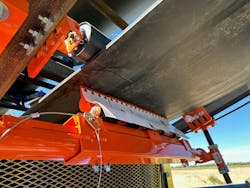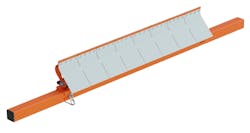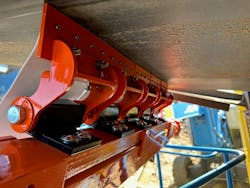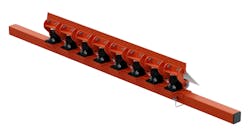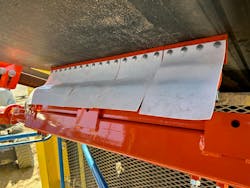SQC2S Orion Secondary Conveyor Belt Cleaner for Easy One-Man Maintenance
Designed to withstand the stress of heavier loads carried on wider, thicker belts at higher speeds, the next generation of the SQC2S Orion Secondary Cleaner uses individually cushioned tungsten carbide blade cartridges to better clean the conveyor without risk to the belt or splices.
A two-tiered tensioning system requires little adjustment and monitoring throughout the life of the blade. The blades are mounted on a slide-in/slide-out assembly for fast and safe external servicing—only needing one worker. The result is improved belt cleaning with less dust and maintenance for greater workplace safety at a lower cost of operation.
Secondary cleaners play an essential role in the belt cleaning process by significantly reducing the volume of dust and fines dropped as carryback on the belt return. Primary cleaners release most of the abrasive material remaining on the belt after discharge. Located below the head pully just behind the primary, secondary cleaners scrape off the fines and dust that hide in cracks and divots in the belt. Carryback is attributed to many environmental and operational issues such as air quality violations, fouling of rolling components and machinery, and increased labor for cleanup and maintenance.
The SQC2S Orion Secondary Cleaner is appropriate for all bulk-handling material applications. The unit is made up of individual 6 in. (152.5 mm) blades mounted on a square steel tube assembly. Not designed for reversing belts, it's suitable for 18 to 96 in. (457 to 2438.5 mm) belt widths, belt speeds up to 1,200 fpm (6 mps), and temperatures up to 250ºF (121ºC).
The second level of tensioning is on the individual blade assembly. Each Orion blade assembly is attached to a steel square tube assembly which is secured by a mounting plate. The square tube houses a rubber tensioner with a torsion arm bolted to each side. A specialized tungsten blade is attached to the arm. The whole system is mounted at a 90-degree angle and then tensioned so each blade is vertical and perpendicular to the belt. As the belt runs, each blade assembly adjusts independently to precisely match the belt's profile, permitting them to compensate for camber, flaws/blemishes, and stubborn material stuck to the belt's face. To accommodate belt cupping and other uneven surfaces, the blade assemblies can be individually adjusted to match the belt profile.
The blades are specially designed for heavy-duty abrasive applications in both dry and wet environments. Tested on hard rock and slurry belts, the Orion blades offered superior cleaning results with a longer equipment life. This is due to the rugged tungsten carbide core surrounded by mild steel. Blades are also available in stainless steel for specific corrosive materials.
The blade design features an attached deflector shield made from polypropene or rugged nylon for high-temperature applications. Mounted directly to the blade in an outward scoop design, the shield ushers loosened material away from the mainframe and toward the discharge chute. This mitigates buildup on the assembly, extending the blade’s effectiveness and reducing the amount of maintenance.
The slide-in/slide-out design allows a single worker to perform maintenance with easy access outside of the conveyor structure, eliminating the need to crawl underneath or awkwardly reach inside.
| Belt Width | 18 to 96 in (450 to 2,400 mm) |
| Belt Speed | Up to 1,200 ft/m (6 m/s) |
| Temperature | Up to 250°F (121°C) |
| Corrosive Conditions | Yes |
| Underground Applications | Yes |
| Compatible w/Reversing Belts or Roll Back | Yes |
| Accommodates Mechanical Splices | Yes |
Martin Engineering
Neponset, IL
Local: (309) 852-2384
Toll-free: (800) 544-2947
[email protected]
www.martin-eng.com
